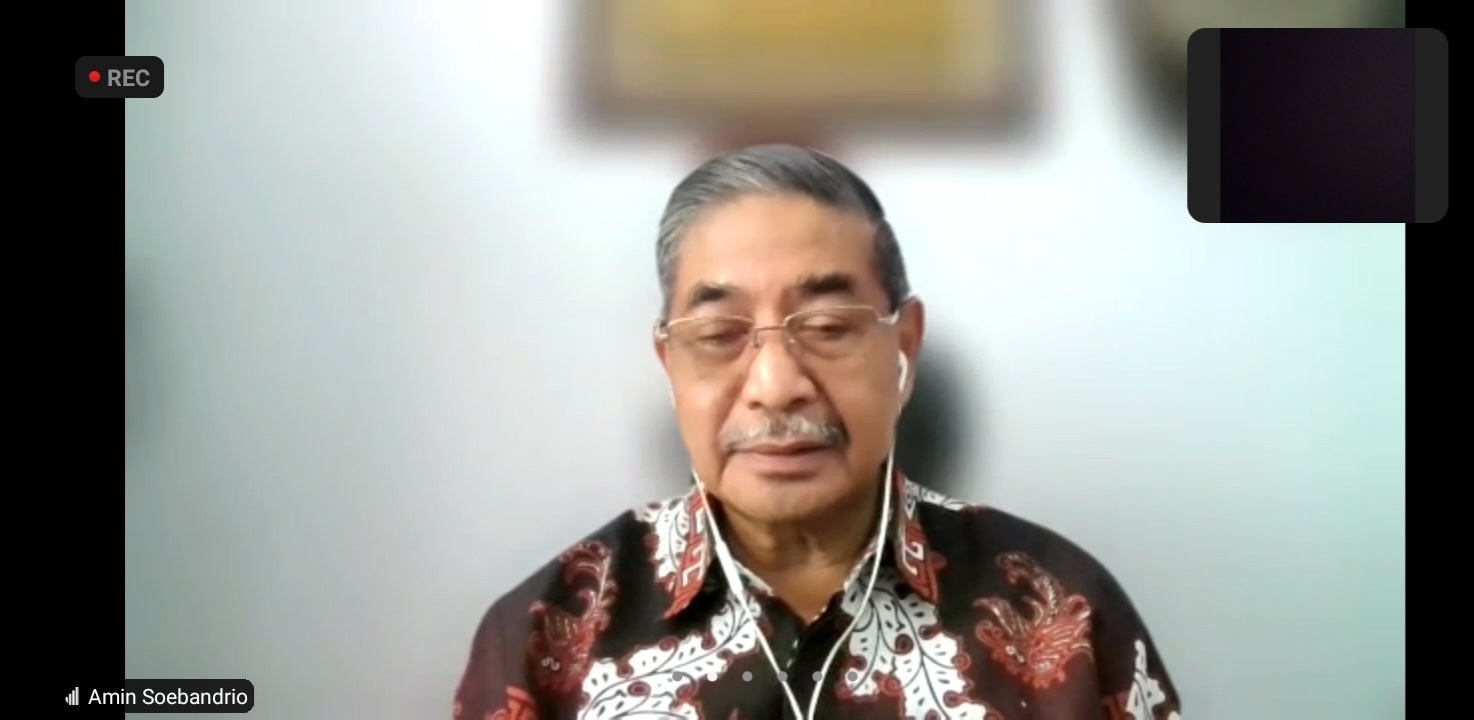On Wednesday (3/3), the FTUI Emeritus Institute again held a Sharing Session with the theme “Enlightenment About the Behavior of the Covid-19 Virus”. Virology-Microbiology Expert and Former Director of the Eijkman Institute, Prof. Dr. Amin Soebandrio was present as a speaker. The event was also attended by the Chair of the FTUI Emeritus Institute, Prof. Djoko Hartanto. Also present were professors and lecturers in FTUI and UI, including: Prof. Bagio Budiardjo, Dr. Azrar Hadi, Dr. Ellen Tangkudung, Ir, Dr. Dewi Matindas, Prof. Dr. Ir. Emirhadi Suganda, M.Sc, Dr. Ing. Ir. Dwita Sutjiningsih, Dipl. HE, and Dr. Djamhari Sirat.
Prof. Dr. Amin Soebandrio explained the material entitled “Covid-19 Behavior Patterns”. By knowing the behavior of the virus, it is hoped that the community can respond to its existence wisely. The Covid-19 virus can be said to be a “beautiful” virus because it has an attractive shape and layer. But the beauty of its shape needs to be watched out for because this virus is dangerous. The structure of the corona virus consists of spikes, membrane proteins, envelopes, RNA, and N-proteins.
From this structure, the function of this spike is to attach to receptors in human cells. After the virus successfully attaches to the receptor and enters the cell, the N-protein will release genetic material into the cell it is in and there will be replication in the cell it lives in.
“There are actually more than 200 types of coronavirus, but most of them are in wild animals and don’t infect humans. The Sars-Cov type coronavirus that infects humans was first discovered in 2001-2002. This virus has been widely reported in China and was feared to spread, but this virus did not develop further into a pandemic. Only then at the end of 2019, Sars-covid-2 appeared and we are still dealing with it,” said Prof. Dr. Amin Soebandrio.
The behavior pattern of the Sars-covid-2 virus that needs to be known is the ability of the virus to mutate. Mutations of this virus occur naturally in an effort to survive. Mutation of the virus takes about 1–2 months. However, as we all know, the Covid-19 virus has infected hundreds of millions of people around the world. This certainly increases the possibility of the virus to replicate and mutate.
“Today’s data, the Covid-19 omicron variant has dominated up to 98.5% of all variants in Indonesia. So far, people think that Omicron has mild symptoms, but keep in mind that the delta variant is still around 1.3% and at this time the number is still fluctuating. As of last month, there were still quite a lot of people infected with the delta variant. While we cannot distinguish which type of Covid-19 is circulating in an environment. Therefore, at this time we think it is not yet time for Indonesia to declare that it is now endemic,” said Prof. Amin Soebandrio.
There are two possible future scenarios, namely, this pandemic will become endemic, or there may be a more deadly variant of the delta. Currently, a new corona virus strain or family has been found, namely NeoCov. The new variant has only been found in African bats, which are mutations of the Mers-coronavirus. Researchers say it only takes one more mutation to turn this virus into a human virus. NeoCov will be more difficult to deal with because it cannot be treated with current drugs and cannot be prevented with available vaccines.
The Dean of FTUI, Prof. Dr. Heri Hermansyah, ST., M.Eng., IPU., welcomed the sharing session from the Emeritus Institute of FTUI. He also stressed the importance of preventing viruses from finding new hosts to replicate so as not to cause new mutations. This prevention can be done by the community by implementing health protocols and vaccinations.
***
Public Communication Bureau
Faculty of Engineering, Universitas Indonesia

